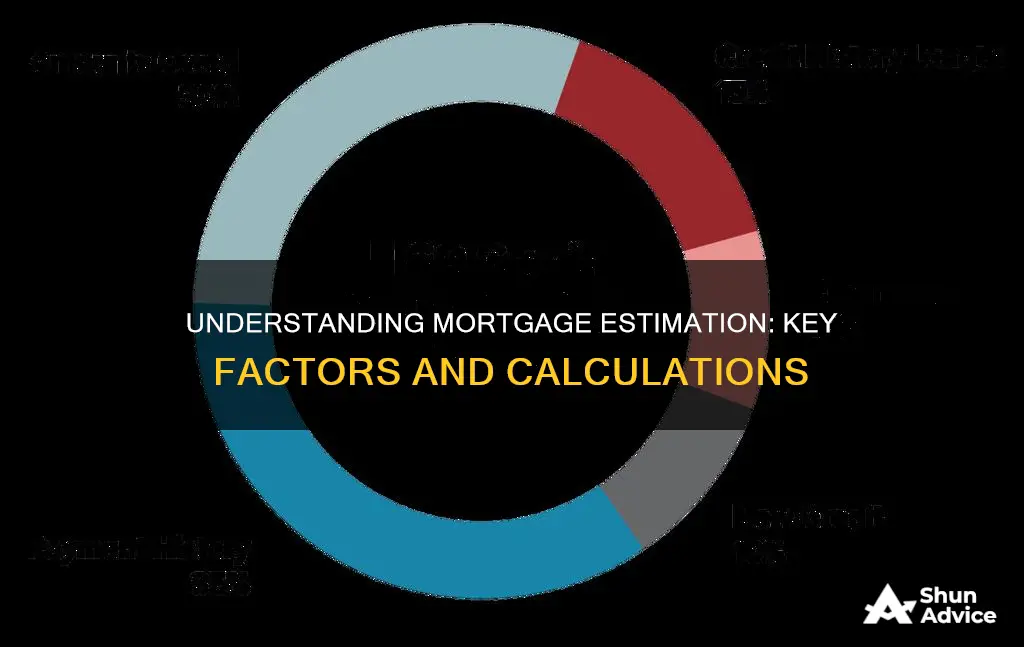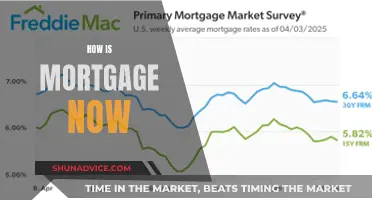
A mortgage is a huge financial commitment, so it's important to calculate your estimated mortgage payment to determine whether you can afford the home you're interested in buying. There are several factors that go into estimating a mortgage, including the market value of the home, the loan amount, interest rates, and additional costs such as property taxes, insurance, and closing costs. Using a mortgage calculator can help you estimate your monthly payments and understand what is included. It's also important to consider your other financial obligations and goals when estimating a mortgage to ensure that the monthly payments won't prevent you from meeting those obligations.
| Characteristics | Values |
|---|---|
| Purpose | To estimate monthly mortgage payments |
| Factors Considered | Principal, interest rate, loan term (years), start date, property taxes, insurance, and credit score |
| Tools | Mortgage calculator, loan estimate |
| Considerations | Down payment size, interest rate changes, financial obligations, budget, and closing costs |
What You'll Learn

Mortgage calculators
There are many free mortgage calculators available online, such as those offered by Zillow and Bankrate. These calculators allow you to input various factors, such as the home price, down payment amount, loan term, and interest rate, to estimate your monthly payments. They also often include additional features, such as amortization schedules, which can help you understand how extra payments can impact the total cost of your loan.
When using a mortgage calculator, it's important to have a good understanding of the different types of mortgage loans available and the associated costs. For example, conventional loans typically require a higher down payment and have either fixed or adjustable interest rates. On the other hand, loans such as VA loans and some USDA loans may require little to no down payment. It's also worth noting that if your down payment is less than 20% of the home's purchase price, you'll likely need to pay mortgage insurance premiums, which will increase your monthly payments.
Additionally, mortgage calculators can help you weigh the benefits of different down payment sizes and interest rates. For instance, you can adjust the down payment amount to see how it affects your monthly payments and overall loan cost. Similarly, you can modify the interest rate to evaluate the impact of small changes, which can help you decide whether to wait for a better rate or improve your credit score to qualify for a lower rate.
Overall, mortgage calculators are a valuable resource for anyone considering buying a home. They can help you estimate your monthly payments, understand the true cost of homeownership, and make informed decisions about your budget and loan options. By using these tools, you can ensure that you're financially prepared for one of the most significant purchases of your lifetime.
Mortgage Borrowing: When Is It Too Much?
You may want to see also

Down payments
A down payment is a percentage of a home's purchase price that is paid upfront when a buyer closes their home loan. The amount of the down payment is subtracted from the total cost of the property, and the remainder is the amount borrowed through a mortgage. For example, a 10% down payment on a $400,000 home would mean a mortgage of $360,000.
For conventional or FHA loans, a down payment of less than 20% of the home's purchase price will usually require the borrower to pay mortgage insurance premiums, increasing the monthly payments. This is because the lender is taking on more risk by lending a higher proportion of the property's value.
When deciding on the size of a down payment, it is important to consider the impact on monthly payments, as well as the potential benefits of putting down a larger sum. A bigger down payment may make it easier to get approved for a mortgage and could qualify the borrower for a lower interest rate. However, it is also important to ensure that a large down payment does not leave the buyer with insufficient savings to cover emergency costs or home repairs.
Mortgage calculators can be a useful tool for estimating monthly payments and understanding how different down payment sizes will affect these payments.
Paying Off My Mortgage: Strategies for Faster Freedom
You may want to see also

Interest rates
Mortgage interest rates fluctuate based on various factors, including inflation, the pace of economic growth, Federal Reserve policy, and the demand for mortgage-backed securities or mortgage bonds. When inflation is high, interest rates also tend to increase to keep up with the value of the dollar. Similarly, when the economy is doing well, mortgage rates increase as borrowers can afford more, resulting in a more competitive market for mortgages. On the other hand, when the economic outlook is not favourable, with high unemployment and low demand, mortgage rates tend to decrease.
A borrower's credit score is another critical factor in determining mortgage interest rates. Lenders view a high credit score as an indication of a borrower's creditworthiness and tend to offer lower interest rates as the risk of default is perceived to be lower. Conversely, a low credit score may lead to significantly higher interest rates as lenders seek to mitigate their risk.
Other factors that can influence the interest rate offered to a borrower include their income, debt-to-income (DTI) ratio, assets, and existing debt. A larger down payment can also help secure a lower interest rate and decrease the monthly mortgage payment. Additionally, the type of mortgage loan, such as a conventional or adjustable-rate loan, can impact the interest rate offered.
It is worth noting that even small changes in mortgage interest rates can lead to a significant difference in the total cost of a loan over its lifetime. Therefore, it is essential to consider various factors and shop around for different lenders and loan types to find the most suitable option.
Freedom Mortgage: My Journey to Requesting It
You may want to see also

Closing costs
After applying for a mortgage, the lender will provide a Loan Estimate document outlining the projected closing costs and other details. A few days before the closing, a Closing Disclosure document will be provided, detailing the final closing costs. While the buyer pays most of the closing costs, the seller typically pays a few as well, such as the real estate agent's commission and sometimes a real estate transfer tax.
Creating a Legal Mortgage: Understanding the Process and Requirements
You may want to see also

Property taxes and insurance
Homeowner's insurance is an annual premium that covers damage to your property and the things you keep inside. It is based on the home price and is usually less than 1% of the home price. Like property taxes, you pay a portion of the insurance premium each month with your mortgage payment. If you live in an area that is prone to disasters, you will be required to have additional coverage.
If you have an escrow account, you pay a set amount toward these additional expenses as part of your monthly mortgage payment. Your mortgage lender typically holds the money in the escrow account until the insurance and tax bills are due, and then pays them on your behalf.
You can also pay property taxes separately. This means you will need to budget accordingly to cover any tax increases, as you will be responsible for paying the full amount directly to your tax authority when it is due. This requires more proactive financial planning but gives you greater control over the timing of your tax payments.
The Cost of Borrowing: $2 on a $400,000 Mortgage
You may want to see also
Frequently asked questions
A mortgage estimate is a calculation of how much money you will need to borrow to purchase a home, and how much this will cost you in monthly payments.
You will need to know the market value of the home you want to buy, the type of mortgage loan you will secure, and the interest rate. You can then use a mortgage calculator to estimate your monthly payments.
Your monthly mortgage payment will include the principal (the amount you borrow) and the interest (the lender's charge for lending you money). It may also include property taxes, homeowner's insurance, and mortgage insurance.
You can use a mortgage calculator, which is a free tool provided by many financial institutions. You can also request a Loan Estimate from a lender, which will give you important details about a mortgage loan.







